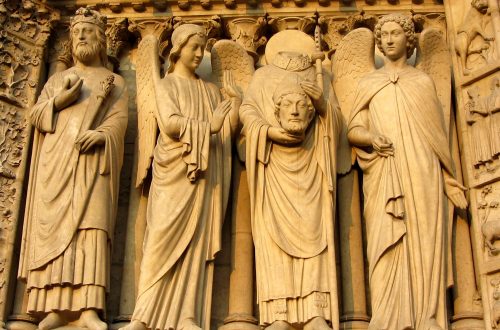Neely Tucker reviews Bart Ehrman’s Misquoting Jesus in last Sunday’s Washington Post (click here). Unfortunately, the review takes up some of the tendentious claims that Ehrman puts forth in the book. One such claim is Ehrman’s contention that the variations in the manuscript copies of the New Testament undermine the Christian faith. The Post review writes:
Most of these are inconsequential errors in grammar or metaphor. But others are profound. . . [One] critical passage is in 1 John, which explicitly sets out the Holy Trinity (the Father, the Son and the Holy Spirit). It is a cornerstone of Christian theology, and this is the only place where it is spelled out in the entire Bible — but it appears to have been added to the text centuries later, by an unknown scribe.
The text in question is 1 John 5:7, the so-called Comma Johanneum (a.k.a. the “Johannine commaâ€). Yes, the reading was erroneously added by a later scribe. But the Post review wrongly implies that the doctrine of the Trinity is dependent upon this particular reading (which is reflected in the King James Version). Nothing could be further from the truth.
The 2nd, 3rd, and 4th centuries debates over the Trinity never appeal to this verse as a basis for Trinitarian theology. If the reading were so fundamental to that particular doctrine, it would be odd to find that the early church never referred to it. The fact is that the doctrine of the Trinity was not dependent on 1 John 5:7 because the doctrine of the Trinity was hammered out without dependence upon it.
This is just one of many baseless claims in Ehrman’s book. Unfortunately the Post is repeating the error.
_____________________




One Comment
Mark
D,
That is a difficult article to read. I really feel bad for Ehrman. All the knowledge of a scholar; with academinc success, a beautiful house, loving wife, yet he still has that emptiness. He should try to see why there is still turmoil inside even after all the outside answers have satisfied him.
How does this happen? Is it disbelief in the power of the Holy Spirit to have guided the church throughout history? Did he never truly believe?
It doesn’t sound to me like he just prematurely ran away from his faith under baseless questions or persecution. It seems to me that with his popularity, and background, Ehrman had good reason to shy away from causing a stir. It also seems like he went further than most will ever go, or get a chance to, in trying to understand the church’s history and the reliablity of the Bible. I was shocked when I read ‘Case For Faith, maybe it was ‘Case For Christ’, that one of Billy Grahams closest associates, who was with Billy when he began his ministry, moved away from the Lord and ultimately rejected his faith in Christ.
From the article, I don’t see that the WP writer went out of his way to unfairly criticize 1John 5:7. I think it profound too. It doesn’t mess me up though, because like you, I know there is so much more evidence than that verse, and I don’t beleive it is duplicated by other English translations.
I had a similar reaction when I first came across this textual problem. I was discussing Trinitarian texts in the Bible and a fellow believer pointed me to his fool-proof text for the Trinity: 1John 5:7. Even though I had studied this doctrine, I didn’t recall KJV’s version of ‘Father, Word, and the Holy Spirit’ in any of the translations I was familiar with. Well to my blessing, I had my copy of the NET Bible and it points out this error in it’s textual criticism section (it exaplined in fair detail the J Comma – fascinating). My well meaning friend was blown away because he had relied so heavily on this text. I assured him all was well, and proceeded to show him the large volume of Biblcal trinitarian texts, as you pointed out D. So it seems there are some, maybe not scholars, who don’t know better yet, but should.
Grace and peace,